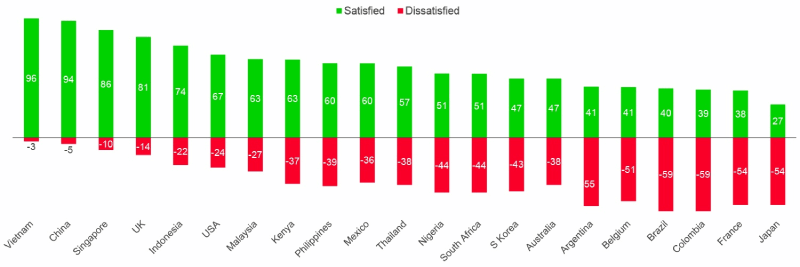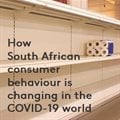Kantar’s Covid-19 Barometer has been exploring people’s feelings and expectations around the world since the start of the pandemic. As we mark 500 days since the WHO (World Health Organisation) first became aware of a “pneumonia of unknown cause in Wuhan”, and as some countries release restrictions while others still face devastating times, new data from Wave 9 of the study (April 2021) revisits changing habits and behaviour and looks at current issues and challenges.
The study shows how Covid-19 has affected most people around the world.
Globally, 42% have been personally affected by Covid-19; 8% report having contracted coronavirus; 23% say a close family member was affected; and 23% that a close friend contracted the virus. The impact is more extreme in South Africa, where 74% of South Africans have either personally contracted the virus or know someone who has.
Widespread concern
Although the situation has eased in many countries, anxiety and caution remain very high, with 70% agreeing that coronavirus still concerns them ‘hugely’ (vs 79% in April 2020). The advent of the vaccine is transformative. In countries where the vaccination rate is over 30% and the new case rate is low, stable or declining (‘leading’ countries), the level of concern has fallen from 76% to 57%. In countries where the case rate is not declining (‘lagging’ countries), the anxiety level has increased from 75% to 80% today.
In South Africa, the situation is a little different. Although a high 74% are deeply concerned about the situation (down from 80% in August 2020), the focus of their concern is primarily financial and not health related, with 59% concerned about their finances vs 34% concerned about their health.
The impact on mental health
The study shows that the mental-wellbeing cost of the pandemic persists. Almost half of respondents globally (42%) and 44% in South Africa feel the pandemic has affected their mental health. Progress in vaccine distribution appears to be acting as a release valve, as the reported impact is significantly lower in ‘leading’ countries (35%) compared to ‘lagging’ countries (49%).
Young people are most profoundly affected, with 18-24-year-olds reporting the worst impact, followed by 25-34-year-olds. Those aged 65 or over continue to have the lowest level of impact, although this has increased to 29% from 21% in August.

The situation impacts my mental health (%)
click to enlargeThe financial impact
Our research shows that over half of people globally (54%) have felt an impact on their income.
In South Africa, the situation is far more dire, with 74% having experienced an impact on their income, worst amongst our ‘nillionaires’ or households with an income of R5,000 or less, where 78% have experienced an impact and 28% have become unemployed as a direct result of the pandemic (vs 13% of upper income households).
This has meant that consumers, particularly in South Africa, are paying more attention to prices and products on promotion. Globally, 70% of people continue to pay more attention to prices in stores, supermarkets and shopping malls compared to 64% in April 2020, and 58% (+10%) pay more attention to products on sale. In South Africa, the focus on price and promotion is even higher.
The overall impact from a brand perspective is that more than half of South Africans are going out of their way to find the best prices and have tried different brands that they will continue to use post-pandemic.
Satisfaction with government responses
Overall, we found that governments still enjoy a majority of approval, although at a lower level than in April 2020. Over half (55%) approve of the actions their government has taken compared to 61% a year ago. And 28% now disapprove of government action compared to 23% a year ago. Dissatisfaction is significantly higher in ‘lagging’ countries, including Brazil (59% dissatisfaction vs 38% in April 2020), Colombia (44% vs 23%), Argentina (40% vs 13%), Belgium (43% vs 27%) and France (41% in both waves).
Interestingly, the situation is a little different in South Africa, where 62% approve of the way the government is handling the situation, though this is down from 85% in April 2020.
ResearchBarbara Cador,
Kantar 25 Feb 2021 Vaccine competency is masking previous dissatisfaction and driving up approval ratings. The US government experienced a 20-percentage point increase in approval from 35% to 55% between August and now, while the UK government experienced a 13-percentage point increase from 37% to 50%.
The study shows that, globally, 59% of the population are satisfied with the vaccine rollout so far, and 52% in South Africa. Satisfaction appears to be partly based on overall satisfaction with pandemic handling. Amongst the countries with a higher vaccination rate, Singapore and the UK have satisfaction levels of 81% and 86%, while the US is at 67%. Vietnam, Indonesia and Malaysia all enjoy 60% plus approval, despite single-digit vaccination rates; reflective of their populations’ general approval levels for handling the pandemic.

Satisfaction with government vaccination campaigns (%)
click to enlargeThe new retail landscape
During the pandemic, 35% of people globally bought their groceries online (up from 21% before the pandemic) and we project it will stay at this level through 2021. The trend was no different for South Africa where online purchase of grocery and household products have increased, driven by the use of social media as platforms to buy and sell.
Positive online experiences have captured a new committed audience. Half (49%) of respondents had mostly good experiences buying groceries online, and 38% globally believe they get a better range online. More than one in three now prefer buying groceries online. In South Africa, there is some room to improve the online experience with only 39% having had ‘mostly good’ experiences with their online purchase.
ResearchKarin Du Chenne 17 Sep 2020 We also see that localism continues to be important. Half (52%) of all respondents now pay more attention to product origins than they did pre-pandemic and 68% prefer supermarkets close to home while 64% think local stores are important for the community. Supporting local is even higher on the agenda for South Africans, with 79% saying that shopping at local stores is important for the community and 79% prefer to shop close to home.
Lockdown living
Globally, e-commerce has become more embedded in our lives, now ranking as the number one activity people do more than they did pre-pandemic. In May 2020, e-commerce ranked in just fifth position.
Our intentions around healthy eating habits have also changed: previously ranked as the number two priority for maintaining a post-lockdown life, it has since dropped to fourth position, after online shopping, increased hygiene and spending time with our household. Ranking number three in May 2020’s list of intentions, spending time with our families remains in third place in today’s ‘increased activity’ list.
Our promises for personal development have waned though. Originally number four in May 2020’s list of intended behaviours, it has fallen to number 10 in behaviours we are now doing more. Not surprisingly, Zoom has become the fifth-most used social media app behind YouTube, Facebook, WhatsApp and Instagram, and has been used by approximately two-thirds of survey respondents this year.
Social MediaIzzy Pugh,
Kantar 25 Mar 2020 In South Africa, an increase in overall hygiene remains the top behaviour that has increased, followed by an increase in social media app usage, with one in three saying they are using more social media now than in the past. South Africans are also bringing their lives closer to home, focusing on their personal development, eating healthier and shopping online. Interestingly, we have seen a high increase in the number of people who now classify themselves as students, particularly amongst the ‘nillionaires’.
Getting back to ‘normal’
We have found that while people do feel more comfortable returning to their day-to-day activities than before, those levels of comfort remain low. Approximately one in three people feel comfortable going back to the office, visiting the hairdresser, sending their children to school, doing non-food shopping, going to bars or restaurants and travelling within their own country. Around one in four is now comfortable going to religious gatherings, the gym and the cinema, but less than one in five feels comfortable with large events, like sports and foreign travel.
Sources of vaccine information remain contentious. Less than half of respondents describe government, health authority or doctors as reliable information sources, suggesting governments need to do more work to instil confidence in their populations.
We also found that a significant level of vaccine hesitancy continues to persist, with 17% of respondents reporting they would probably or definitely not get a vaccine globally, 13% in South Africa. Hesitancy is highest in the 18-24 age range where, for most of the world, the opportunity to be vaccinated does not yet exist, compared to 8% hesitancy in the 65+ age group. Reasons for hesitancy include fear, distrust and misinformation.
From this ninth wave of research, it has become clear that in countries with a more advanced vaccination programme, resumption of everyday life is on the horizon. People have less anxiety, feel more secure and are more open to re-engaging with the world. This is a welcome development, but the long-term outlook is still challenging for many people. So, while the transformation of the retail sector looks set to stick, people’s intentions for personal transformation during lockdown have tended to fade.
Get in touch to find out more about the findings from Covid-19 Barometer Wave 9 and follow us on LinkedIn and Twitter for our latest insights to help you understand people and inspire growth.
About the author:
Kantar’s C-19 Barometer Lead for South Africa, Stacy Saggers, works across brand, customer experience, innovation, media, digital, product and pack innovation and e-commerce research. She can be reached on moc.ratnak@sreggas.ycats.
